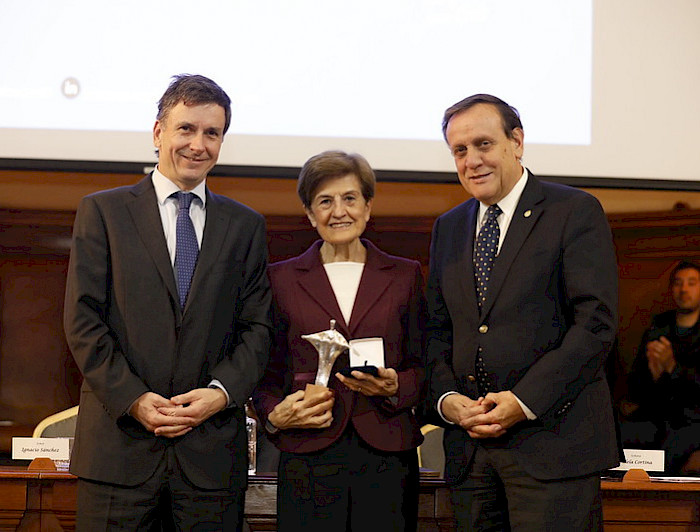Newly Inaugurated Institute of Applied Ethics Focuses on Developing Ethical Discernment
This new interdisciplinary academic unit was inaugurated with a lecture titled "The Mission of Applied Ethics in the 21st Century University" by renowned Spanish philosopher Adela Cortina. The unit will work towards the development of university ethics that foster the protection and strengthening of trust in academic institutions.

photo_camera During the meeting, the Spanish philosopher, Adela Cortina, received an award from the Director of the Institute of Applied Ethics, Juan Larraín, and the UC Chile President, Ignacio Sanchez. Photo by: César Cortés.
Over 200 people attended the inauguration ceremony of the Institute of Applied Ethics at UC Chile, which took place at the Salón de Honor in Central Campus. The distinguished Spanish philosopher, Adela Cortina, a faculty member from the University of Valencia and director of the ETNOR Foundation for business and organizational ethics, was present at the event. She delivered a lecture titled "The Mission of Applied Ethics in the 21st Century University."
“The Institute provides a prominent space for the development of interdisciplinarity as an academic innovation. The inherent nature of applied ethics requires interdisciplinary work, both in teaching and research. That's why the Institute of Applied Ethics includes the entire university and aims to contribute to reflection and practical ethical action, both within and outside the university, with a focus on thinking and doing," said UC Chile President Ignacio Sánchez in his speech.
“Ethical deliberation should be a habit and a characteristic of our students, faculty members, professionals, staff, and the community as a whole. As highlighted by our distinguished guest, Professor Adela Cortina, 'ethics empower individuals, giving them the strength to lead a good life.' That is what we want for our professionals, our students, and our community—to be a genuine contribution to a just and prosperous society.”
Building Trust and University Ethics
In his address, Juan Larraín, Director of the Institute of Applied Ethics, urged attendees to reflect on the relationship between university ethics and trust. "There is no doubt that we are currently experiencing a significant trust crisis. The public has a profound distrust in most institutions, but it is interesting to note that within this context, people still hold some level of trust in universities. This trust carries an enormous responsibility—it is a valuable asset that we must cultivate and safeguard as a true treasure, as it is a fundamental resource for fulfilling our mission," he stated.
"At the Institute, we will strive to work towards the development of research ethics by actively promoting a social epistemology in conjunction with a virtue epistemology (…). By fostering and committing to these two types of epistemology, we can enhance the integrity of research and, consequently, uphold and strengthen the ethics of universities, while maintaining and reinforcing trust in academic institutions.”
The Mission of Applied Ethics
Professor Adela Cortina, Emeritus Professor of Ethics and Political Philosophy at the University of Valencia, Spain, visited Chile as a guest of the Chilean Academy of Social, Political, and Moral Sciences, to which she was made an Honorary Professor. In her lecture "The Mission of Applied Ethics in the 21st Century University," she emphasized the social importance of ethics and the need to recognize its empowering capacity for individuals to pursue a "good life," beyond considering it merely as a discipline that imposes restrictions. She also highlighted the concept of "positive sum," which refers to the possibility of contributing through dialogue between diverse ethical approaches, such as Christian ethics and secular ethics, which is characteristic of a pluralistic society in the 21st century.
When discussing the dimensions of a general university ethic and the importance of interdisciplinarity, she asserted that "there is no single problem in the university that can be solved from only one discipline."
In that sense, she emphasized the relevance of linking university ethics with the applied ethics of various disciplines, both scientific and humanistic, stressing the need to "jointly seek the truth" and "put all our knowledge in the service of people."
- Access the full speech of Juan Larraín, Director of the Institute of Applied Ethics, here.
- Check out the photos of the event here.


